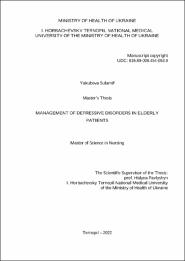| dc.description.abstract | Depression is the most common mental disorder in elderly people. The average prevalence of depression in the elderly is 12.3%, increasing progressively with deterioration of somatic status and disability. The aim of this study is to investigate the current issues of diagnosis and treatment of depression in elderly people, to conduct a study of the causes and symptoms of depressive mental disorders in elderly patients as factors that define the characteristic features of management of depressive disorders in elderly patients. The following special methods have been used: clinical examination and history collection, pathopsychological assessment, examination by a neurologist and internist, laboratory and instrumental examination. For a preliminary assessment for the presence of depressive disorders in the patients, we used Geriatric Depression Scale (GDS).
In elderly patients with depression often have such types of disorders as dysthymia, mixed anxious depressive disorder, atypical depression and seasonal depressive disorder. This clinical research shows the characteristic features of depression in elderly neurological patients and the principles of its therapy. Adequate management of the underlying neurological disease, the use of effective and safe antidepressants combined with neurotrophic therapy allows for an effective control of depression in the elderly neurological patients. The author has defined the principles for organization of medico-social assistance for elderly patients with depression and somatic disease. | uk |

